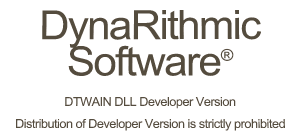DTWAIN Licensing Information
Developer-only Licenses
The Developer-only license
allows you to continue to use and test the DTWAIN Library indefinitely beyond
the 30-day trial period but not distribute your applications to
third-parties.
In addition, a Developer license must be purchased for each developer who works
on a product or project using DTWAIN. No matter what type of applications are
being developed, a separate DTWAIN Developer License must be purchased for each
developer working with DTWAIN.
The Developer License version of
DTWAIN will start with a splash screen that will be displayed for 5
seconds when the DTWAIN DLL is loaded in memory, informing the developer and any
other person running the DTWAIN application that the DTWAIN DLL that has been
loaded in memory is a Developer version. The splash screen is to
ensure that distribution of the Developer version to unwarranted parties is
reduced.
Sample:

To remove the splash screen, a Distribution license
must be purchased (see below). Otherwise, the Developer version is
not crippled in any way (no time limits, and no decreased functionality from a
Distribution version of DTWAIN), allowing you to continue development and
testing of DTWAIN for an indefinite amount of time.
Also, for
Developer-only licenses, you are allowed "personal use" of your DTWAIN
applications.
If you are using DTWAIN to create applications that you will personally use
and/or will not distribute your programs to other companies for others to use,
and you do not distribute the DTWAIN DLL and related files, this is considered a
valid use of the Developer-only license. In other words, "personal use"
applications do not need any additional Distribution Licenses.
For example, if you create an application that you personally
use to scan images, and then on site at another company you use the same program
but do not give ownership of the program to the company and the DTWAIN DLL's
and other related components are not available to the company when your program
is not in use, then you do not need any additional licenses. This still
counts as "personal use" of DTWAIN.
Distribution Licenses
Distributing your DTWAIN applications
In addition to the Developer License described above, If you
plan on distributing your DTWAIN applications under one or more of the following
scenarios:
-
Public distribution of your application (commercial,
freeware, shareware, etc.),
-
Use the DTWAIN applications in a company by more than one
person
-
Distribute the application to other company sites
-
Use DTWAIN in a web-based application (Internet or Intranet)
then you must purchase at least one of the various
Distribution Licenses described below, in addition to at least one
Developer license. Otherwise,
A Distribution License grants you the rights to
distribute your application to any number of individuals, and with exception of
the Toolkit License, royalty-free, for an unlimited number of applications.
On purchase of a Distribution License, the opening splash-screen that comes with
Developer-only versions of DTWAIN will be removed.
Distribution Licenses come in the following categories:
-
Company Distribution License
-
General Distribution License
-
Toolkit Distribution License
The Company Distribution license allows you to create an
unlimited number of royalty-free applications that use DTWAIN, and distribute
these programs within the same company at a single company site to any number of
individuals. If the program will be used on a network, then a Company
Distribution license is required. If the application will be used within an
Intranet environment, a Company Distribution license must be purchased.
The General Distribution license allows you to create an
unlimited number of applications that use DTWAIN, and distribute the programs in
any environment and by any means, royalty-free. The applications can be
fee-based, where the user must pay a fee to use the applications (for example,
commercial and shareware applications), or freeware applications. Also, if the application is an Internet based
application, then a General Distribution license must be purchased.
The Toolkit Distribution license is a special license
required if your application is a programmer's toolkit or API that will allow
programmers to call, either directly or indirectly, DTWAIN functions. Unlike the
other Distribution Licenses, the Toolkit Distribution License is subject to
royalty fees, where the fee depends on your product's pricing and number of
projected sales.
